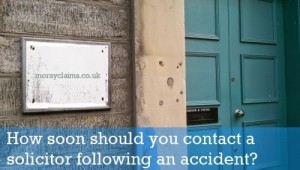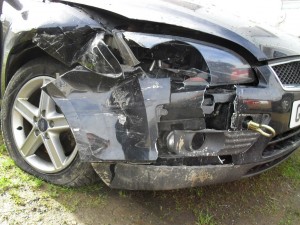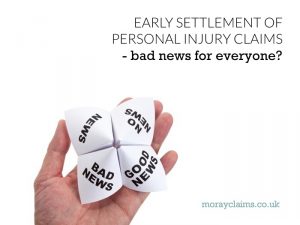In Scotland, there are more than 550 golf courses and Moray has 9 of them. I’m a (sadly, very inactive) member of Moray Golf Club (Lossiemouth), which has two fantastic links courses. An appeal decision of the Court of Session from March 2013 has health and safety implications for golfers and golf clubs all over Scotland. The Facts of the Case The case of Phee –v- Gordon concerned an inexperienced golfer (Mr Phee) who sued Niddry Castle Golf Club in West Lothian and a member of the golf club (Mr Gordon) as the result Mr Phee losing his left eye after being struck by a golf ball from a wayward tee shot hit by Mr Gordon. Arguments that Mr Phee was partly to blame for his injury were rejected by the court. However, the appeal was successful in that Mr Gordon convinced the court that the blame which had been apportioned as 30% to the golf club and 70% to Mr Gordon following the initial hearing of evidence should be reversed – and more - on appeal. In other words, though the Continue Reading
Not Wearing A Seatbelt: How It Can Affect Your Personal Injury Claim
General issues about contributory negligence in PI cases In many personal injury claims, though it’s clear that the accident was the fault of someone else – which means the claim should succeed - there can be arguments about whether you as the injured person should share some of the blame for the accident. This is what is referred to as contributory negligence. It is often possible to counter arguments for contributory negligence, meaning that your claim succeeds in full. It is up to the other side to prove contributory negligence applies in the circumstances rather than being up to you to prove that you did take proper care for your own safety. If contributory negligence applies, your compensation will be reduced. In our experience, across the personal injury accident spectrum, reduction rates most often tend to be in the 10% to 25% range. In other words, for example, if contributory negligence is 25% then you lose one quarter of your damages. Why the level of Continue Reading
A Personal Injury Claim is not a “Small Claim” in Scotland
In Scotland, a “small claim” is a type of Sheriff Court procedure which applies to claims with a value of up to and including £3,000. What Sorts of Claims are Small Claims? There are three kinds of claim which can be raised under small claims procedure and they are as follows: A claim for payment of money A claim for delivery or recovery of moveable property A claim for implement of an obligation Claims for payment of money are, in our experience, the most common type of small claims action by far. Examples of claims for payment of money include: Compensation for damage caused by faulty workmanship Expenses incurred in repairing damage caused to a vehicle in a road traffic accident Money owed in terms of a loan Goods ordered and paid for but not supplied Unpaid bills Personal Injury Claims are not Small Claims Note that personal injury claims are not small claims under any circumstances. They are exempted from the small claim definition. Personal injury actions in the Continue Reading
Failure to Wear a Cycle Helmet: Can You Still Claim for Injury?
If you are involved in a road traffic accident while riding a bicycle, are you still eligible to make a claim for compensation if the accident was not your fault but you were not wearing a cycle helmet at the time? The answer is very likely ‘yes, you can still claim successfully'. The issue which arises is contributory negligence. No Legal Requirement to Wear a Cycle Helmet Unlike seatbelts in cars, there is no legal obligation to wear a cycle helmet. In theory, this would not prevent a finding of contributory negligence in any event. With seatbelt cases, the introduction of the legal requirement in the 1980s did not affect the various, fixed levels of contributory negligence that had been developed by the courts during the 1970s (and which still apply today). However, there do not seem to be any reported decisions of the courts to date in which a cyclist has had his or her compensation reduced for contributory negligence due to failure to wear a cycle helmet. The English Continue Reading
Accidents at Work: Now More Difficult to Win (But Still Winnable)
I have blogged previously about the proposed changes in the law relating to Employers’ Liability and it has now come to pass in the Enterprise and Regulatory Reform Act 2013. In broad terms, this is good news for employers and, especially, their insurers and bad news for employees. It was the law that breach of regulations under the Health and Safety at Work Act 1974 could give rise to civil liability. Goodbye to Strict Liability In some cases, this meant that there could be strict liability of employers – in other words, liability without needing to show any fault or lack of care on the part of the employer. The case that came to be the classic modern example of this involved a postman who was injured when the front forks of the bicycle he was riding – and which his employers provided to him - collapsed without warning. It was established that the cause of the equipment failure was a hidden defect. The employers had not been negligent. There was probably nothing they could Continue Reading
How soon should you contact a solicitor after an accident?
You should get in touch with a solicitor as soon as possible. If you have been seriously injured, you may not be fit enough to contact a lawyer yourself for months after the accident. In those circumstances, it can be acceptable for a friend or relative to make the first contact. Most solicitors will do home or hospital visits, if that will help get things under way. Or they can get the basic details from the friend or relative, which will allow a start to be made. Ultimately, it will have to be you, the injured person, who gives the instructions to your solicitor but that is not necessarily essential in the first place. It's never too early to call your solicitor ... Years ago, the Law Society of Scotland ran a marketing campaign with the strapline: “It’s never too soon to call your solicitor … but it could be too late.” This may have been dropped because of the appearance of popular alternatives such as “It’s never too soon to call your solicitor … a b*@!*?@!”. Continue Reading
Bus Passenger Accidents While Getting Onto A Bus And How To Avoid Them
I commute most days to work by bus and am lucky that the most serious ‘accidents’ I have had to date have both affected my clothes only. Knee Slicers and Sticky Chocolate Seating Leg-room is not always great, depending on where you sit on the bus. I once managed to make a neat straight cut through the knee of one trouser leg on the horizontal metal strip on the back of the seat in front of me. More embarrassing was sitting down on a seat which someone had smeared with chocolate sauce. I only realised when I had difficulty standing up to get off at my stop. I’ve learned from that experience to wear jeans on the bus and change into a suit once I get to the office. Bus Timetabling Problems Buses and coaches usually operate according to timetables. Bus drivers have to do their best to keep things running on time. This is a difficult job when there are so many variables. These include things like: how much traffic there is on the road; how many passengers want picked Continue Reading
What is Moray Claims blog about?
Hello. My name is Peter Brash. What’s my line? I work in Elgin, Moray. That’s approximately half way between Aberdeen and Inverness in the beautiful North East of Scotland beside the shimmering Moray Firth. I’m head of the Personal Injury Department at Grigor & Young, Solicitors. Moray Claims is a trading name of Grigor & Young. We also have an office in Forres. Together with my solicitor colleague, Marie Morrison, we have over 40 years’ experience in dealing with personal injury claims for injured people in a wide range of circumstances. I am accredited by the Law Society of Scotland as a Specialist in Personal Injury Law. My colleague, Marie Morrison, and I are both members of the Association of Personal Injury Lawyers (APIL) and Accredited by APIL as Senior Litigators. The Elgin branch of Grigor & Young has corporate accreditation from APIL. So what is Moray Claims blog about? In posting to this blog, I’m airing informal opinions about legal matters – generally Continue Reading
If someone runs into the back of you, is it always their fault?
Rear-end collisions are usually blamed on the driver behind — but there are rare situations where responsibility can be shared. The general rule is that, if you run into the back of another vehicle, you will usually be held at fault and will not be able to claim against the driver in front. This is because drivers are expected to leave enough space to stop safely if traffic ahead slows or stops unexpectedly. This law seems to be generally well understood. What if the driver in front behaved unreasonably? Many people assume sudden or unexpected braking automatically shifts blame — in most cases, it doesn’t. From time to time, we get enquiries from people who have rear-ended another vehicle but consider that the accident was not their fault because the driver in front stopped their vehicle suddenly or without good reason. An example of this is where you are second in the queue at a T-junction and you and the car in front are both turning left. You can see there is Continue Reading
If You Are Injured By An Animal, Can You Make A Claim?
If an animal causes you an injury, can you make a claim for compensation? The modern law of negligence owes a lot to a mollusc but what if you have an accident in Scotland involving an animal – can you claim for your loss or damage? The Cow's Adventure One case from the 1950s involved a clever cow which managed to escape from premises in Inverness’s Eastgate, where it was due to be auctioned. It then managed to climb the stairway of a nearby property and fall through the floor into the shop below. In its struggles it turned on a tap, causing flooding. It also trampled and damaged stock. The Sheriff in that case decided there could be a successful claim against those responsible for the cattle at the time, if they could be shown to have been negligent. Dog Bites In our experience, the most likely injury scenario will involve a person being bitten by an animal, typically a dog. The law here is principally regulated by the Animals (Scotland) Act 1987. Liability Continue Reading
Personal Injury Damages Too Low (According to the People of Elgin – and Beyond)
On 04 May 2013 – a cold and windy day in Elgin - three of us from Grigor & Young / Moray Claims (Ann, Eileen and Peter), took a stall at the Scottish Theme Day run by Elgin Business Improvement District (Elgin BID). Thank you to everyone involved in organising it and all who participated. We ran a competition where we asked people to give their valuation of the injury in the following scenario. Female, aged 42, at the date of the injury and 45 at the date of the hearing, sustained a deep laceration on her posterior left thigh as a result of sitting on a toilet which had a jagged broken edge. The wound bled profusely and she was taken to hospital where it was sutured with seven stitches under local anaesthetic. Approximately two weeks later the wound became inflamed and antibiotics were prescribed. She was unable to work for 10 days and had difficulties sitting down or sleeping on her back for some six to eight weeks afterwards. She was left with a permanent scar measuring 3cm by Continue Reading
Early Settlement of Personal Injury Claims: Bad News For Everyone?
We see this happening much more frequently following accidents involving personal injury. People, who are at their most vulnerable following injury, receive a call from the other party’s insurance company and then a letter offering settlement of their claim at a derisory level. Why? Well, settling the claim quickly is invariably cheaper for an insurer and they know that, without specialist advice, you may not be paid all that you are entitled to receive. If you have suffered a personal injury, it is generally only possible to value the injury part of the claim properly by obtaining medical evidence. The amount your injury is worth depends on things like: the nature and severity of the initial injury; and the length of time it takes you to recover from the injury. Getting medical evidence, including a report from an appropriate medical expert, should ensure that the compensation paid out at the end of the day is fair compensation. And that means “fair” not only to you Continue Reading








